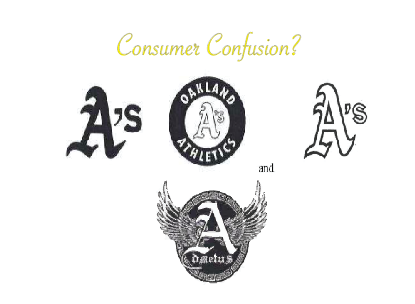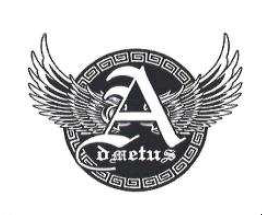The Oakland Athletics (MLB) own several federal trademark registrations. Not to mention, the team is a recognizable brand with an iconic logo. Therefore, it should not come as a shock that they police their trademarks and oppose third party marks when given the chance. In fact, earlier this month, the Athletics opposed registration for a mark belonging to Shenzhen Faren Technology Co., Ltd. (China).
Lanham Act
The Lanham Act governs federal trademark law. 15 U.S.C. § 1125(1)(a) states that an individual will be civilly liable when he or she uses a competitor’s goods and/or services in a way that is “likely to cause confusion, or to cause mistake, or to deceive as to the affiliation, connection, or association of such person with another person, or as to the origin, sponsorship, or approval of his or her goods, services, or commercial activities by another person.”
Specifically, to determine whether trademark infringement is present, a court will look to the following factors:
- the similarity in the overall impression created by the two marks (including the marks’ look, phonetic similarities, and underlying meanings);
- the similarities of the goods and services involved (including an examination of the marketing channels for the goods);
- the strength of the plaintiff’s mark;
- any evidence of actual confusion by consumers;
- the intent of the defendant in adopting its mark;
- the physical proximity of the goods in the retail marketplace;
- the degree of care likely to be exercised by the consumer; and
- the likelihood of expansion of the product lines.
Of the eight factors, the first two factors stand as the most important ones in the court’s analysis.
Reasons for Opposition

On October 13, 2015, Shenzhen Faren Technology Co., Ltd. filed an application on the basis of first use (Section 1(a)) to register the top mark. The first use in commerce was September 28, 2015. Specifically, the mark was associated with International Class (IC) 018 (Leather Goods, which included but were not limited to, backpacks, book bags, sports bags, wallets, and handbags). It is important to note that the 30-day opposition period for the mark began on March 15, 2016, as the Notice of Opposition was filed on September 9, 2016.
The time to file an opposition cannot not exceed 180 days (~6 months), but there are three requests for extension available. The first request carries a thirty-day extension. Additionally, the second request — a sixty-day extension — is only granted if good cause is shown. Altogether, it is possible to file one request that carries a ninety-day extension if good cause is shown. A third request will be granted if, among other reasons, there is proof of extraordinary circumstances.
In its Notice of Opposition, the Athletics, whose ‘A’ is depicted below the top mark and also used in association with IC 018, offered a laundry list of reasons why it opposed registration. First, the team’s counsel argued that their mark possessed and accumulated a lot of valuable goodwill, which “has become closely and uniquely identified and associated with [the Athletics].” Most importantly, the Athletics argued the opposing company’s mark caused consumer confusion and “deceive[d] the trade and public, who are likely to believe that Applicant’s (Athletics’) Goods have their origin with Opposer (Shenzhen Faren) and/or that such services are approved, endorsed or sponsored by Opposer or associated in some way with Opposer.”
What’s Next?
On September 12th, the Trademark Trial and Appeal Board (TTAB) sent out the notice and corresponding trial dates. As such, the upcoming dates are as follows:
- Answer Due: Oct 22
- Deadline for Discovery Conference: Nov. 21
- Discovery Opens: Nov. 21
As is the option in every case, the parties may settle at some point. Is it easier, less stressful, and cost effective for the parties to work out an agreement? Yes, without a doubt. Additionally, the parties may also decide to go through mediation or arbitration. Finally, the parties can “stipulate to follow the Board’s Accelerated Case Resolution (ACR) process for a more efficient and economical means of obtaining the Board’s determination of the proceeding.” However, Shenzhen Faren may proceed with discovery and potentially go forward with trial because the company firmly believes that their mark does not cause consumer confusion with the A’s mark.
Do you think there is a likelihood of consumer confusion between the marks? Let us know in the comment section below or on Twitter!
Follow Rexford on Twitter (@FordSheild) and connect with him on LinkedIn.
All Rights Reserved. No part of this publication may be reproduced or transmitted in any form without the express written consent of the MULS Sports Law Society Blog (“SLS Blog”). The opinions expressed by guests & writers of the SLS Blog are their own, not ones expressed by the SLS Blog.


